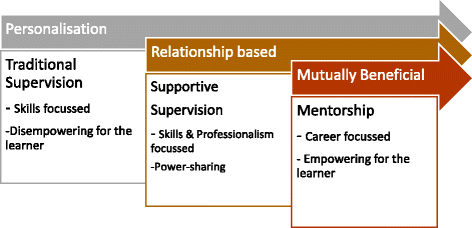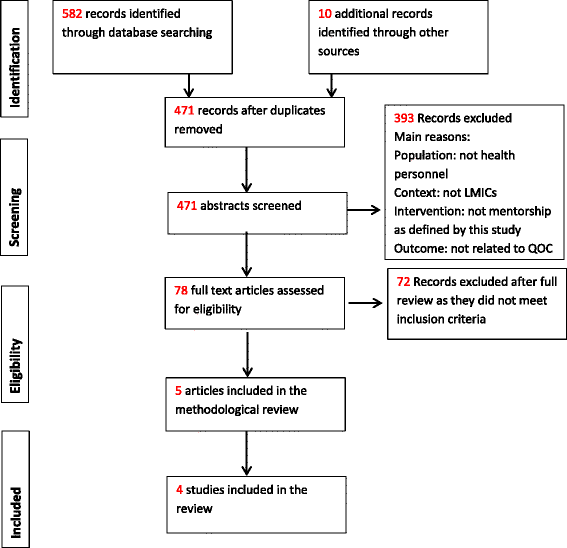A scoping review of mentorship of health personnel to improve the quality of health care in low and middle-income countries
- PMID: 28974233
- PMCID: PMC5627414
- DOI: 10.1186/s12992-017-0301-1
A scoping review of mentorship of health personnel to improve the quality of health care in low and middle-income countries
Abstract
Background: Most Low and Middle-Income Countries are facing a crisis in human resources for health which compromises their ability to meet health related targets outlined by the Sustainable Development Goals. The crisis is not limited to the availability of health personnel but also the quality of care and the training and development of the workforce. To address these challenges, evidence based education strategies are urgently required. Mentorship has been found to improve health personnel performance in High-Income Countries however, little is known about its role in Low and Middle-Income Countries. To address this gap in understanding, we conducted a scoping review of the current literature.
Methods: CINAHL, EMBASE and OVID Medline were systematically searched along with grey literature for peer-reviewed research papers specific to the research question. A six-step scoping review framework was utilised to identify the relevant literature and summarise the pertinent findings.
Results: The initial search identified 592 records, and five papers, reporting on four studies, were retained for data charting and extraction. All four studies described a positive effect of mentorship on the quality of care outcomes. The results are collated according to features of the intervention including mentor training, mentor-mentee ratios, mentorship model, intervention intensity and key findings in terms of outcome measures.
Conclusions: This review identifies a paucity of evidence of mentorship in this context however, current evidence supports the assertion that effective mentorship contributes to the improvement of certain quality of care outcomes. The features of successful mentorship interventions are outlined and the implications are discussed in the context of existing evidence.
Keywords: Health personnel; LMICs; Mentorship; Quality of care; Scoping review.
Conflict of interest statement
Authors’ information
Patricia Schwerdtle (MPH, PGC HPE, PGD Critical Care, Bachelor Health Promotion, BN, RN) Academic, Monash University, Peninsula Campus. Director, Board of Directors MSF Australia. Patricia.schwerdtle@monash.edu
Ethics approval and consent to participate
No ethics approval was required for this secondary research project.
Consent for publication
All authors consent to publication in HRH.
Competing interests
The authors declare that they have no competing interests.
Publisher’s Note
Springer Nature remains neutral with regard to jurisdictional claims in published maps and institutional affiliations.
Figures
References
-
- The World Bank (2015) ‘The World Bank Country and Lending Groups’ accessed 18.2.17 at: https://datahelpdesk.worldbank.org/knowledgebase/articles/906519-world-b....
-
- Bhutta . Systematic review on HRH interventions to improve maternal health outcomes: evidence from developing countries. Pakistan: The Aga Khan University; 2010.
Publication types
MeSH terms
LinkOut - more resources
Full Text Sources
Other Literature Sources
Miscellaneous



